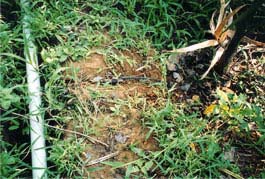Faecal Sludge management
Status of water and sanitation in Nirmal Gram Puraskar NGP villages
Posted on 22 Nov, 2014 10:30 AMStudy of 162 NGP villages awarded the Nirmal Gram Puraskar (NGP) award in 2004-05 and 2005-06.
Guidelines Nirmal Bharat Abhiyan July 2012 A document by Department of Drinking Water Supply
Posted on 22 Nov, 2014 10:30 AMThis document by Department of Drinking Water Supply is on the guidelines of Nirmal Bharat Abhiyan (NBA) (July 2012). The details of the guidelines are elaborated in 23 different sections, followed by an exhaustive list of annexure.
Manual Scavenging Act and municipal wastewater workers in India policy and practice A dissertation
Posted on 22 Nov, 2014 10:30 AMIndian municipal waste water disposal system generated a "neo scavengers" of municipal waste water workers/ sewer workers in organised occupations.
Solutions on the rehabilitation of manual scavengers were been enacted with the Employment of Manual Scavengers and Construction of Dry Latrines (Prohibition) Act, 1993 .
Septic tanks or death tanks We need to improve sanitation facilities to eradicate the inhuman practice of manual scavenging
Posted on 22 Nov, 2014 10:30 AMAuthor : Gagandeep
“We have to end the biggest dehumanising activity called manual scavenging”
Occupational health hazards in sewage and sanitary workers A paper published in the Indian Journal of Occupational and Environmental Medicine
Posted on 22 Nov, 2014 10:30 AMWorking conditions of the sanitory workers have found to remain unchanged over the years and pose a considerable risk to the dignity and health of the workers.
Excreta Matters A profile of the water and sewage situation in 71 Indian cities A report by the Centre for Science and Environment
Posted on 22 Nov, 2014 10:30 AMGuset post: Amita Bhaduri

Source: Excreta Matters, Centre for Science and Environment, 2012
The sanitation crisis in India An urgent need to look beyond toilet provision
Posted on 22 Nov, 2014 10:30 AMGuest post by: Aarti Kelkar-Khambete
Image Courtesy: Wikimedia Commons
The sanitation crisis and the recent evidence on lack of toilet facilities
Communal toilets in urban poverty pockets - A WaterAid report
Posted on 22 Nov, 2014 10:30 AMThis report published by WaterAid describes the findings of the study conducted in seven poverty pockets in Bhopal to look at patterns of use of communal latrine facilities. Much has been invested in building communal and public toilets and more resources are likely to continue to support this form of sanitation in dense urban areas in India.
However, there is no evidence available that is needed to quantify their potential contribution to reducing open defecation and faecal pollution in these environments, and identify those design features and management factors that encourage the highest usage rates by all household members. Also there is no information available on the impact of age and gender related differences in patterns of use.
Toilet manure in organic farming :An article by Varanashi Research Foundation
Posted on 22 Nov, 2014 10:30 AM Human faeces and urine (toilet manure) are a serious waste disposal problem especially in areas with high human population density. At the same time they are rich in nutrients that are essential to plants.
Human faeces and urine (toilet manure) are a serious waste disposal problem especially in areas with high human population density. At the same time they are rich in nutrients that are essential to plants.
Assessing acute Gastroenteritis risks associated with water quality and sanitation in Hyderabad city A paper by the Institute of Health Systems IHS
Posted on 22 Nov, 2014 10:30 AMThe quality of drinking water is a vital element of public health and well-being. The most effective means of consistently ensuring the safety of a drinking-water supply is through the use of a comprehensive risk assessment and risk management approach that encompasses all steps in water supply from catchment to consumer.
WHO guidelines on water quality term these approaches as water safety plans (WSPs), developed to organize, systematize and apply management practices in drinking-water quality.
